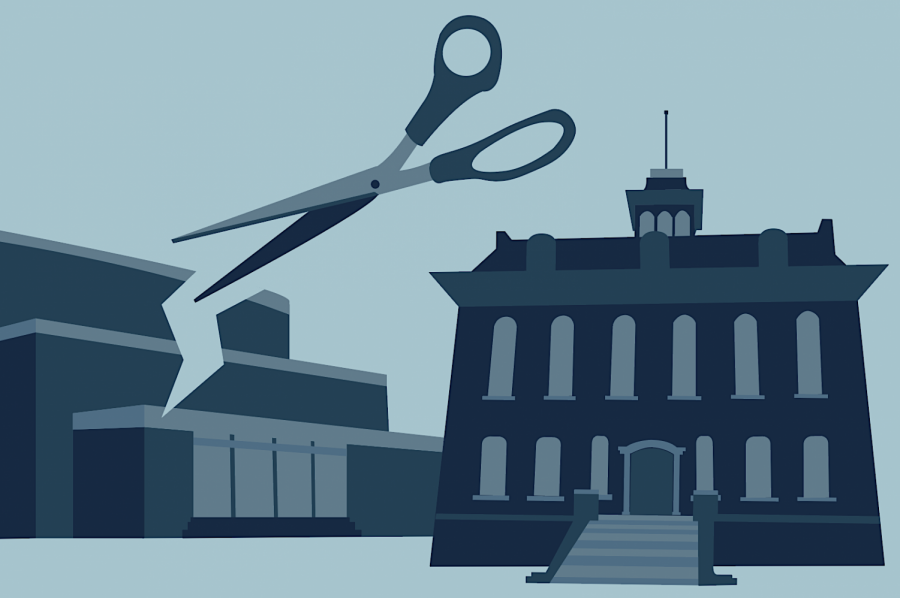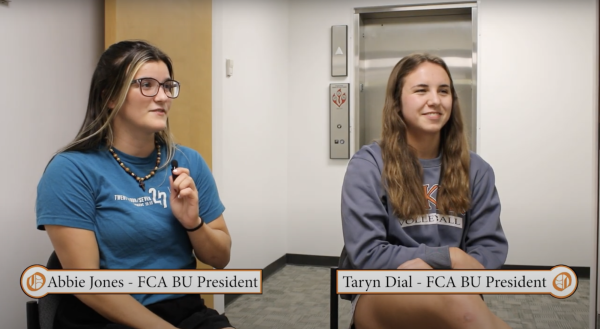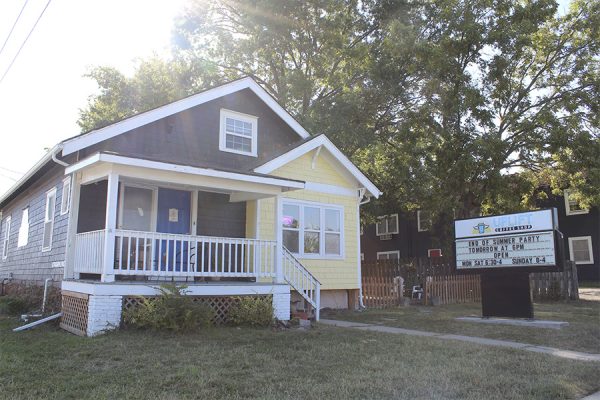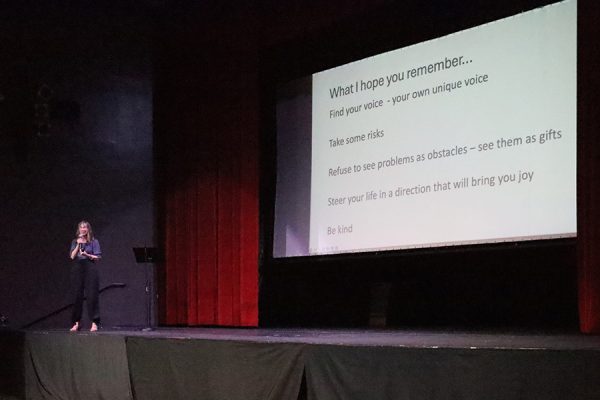University cuts faculty, staff and programs in the wake of financial hardship
According to Baker University officials, the financial impact of the COVID-19 pandemic created hardships resulting in the decision to cut a total of 18 faculty and staff positions, four majors and two minors, to take effect in Fall of 2021.
Like many higher education institutions across the nation experiencing similar issues, Baker University evaluated programs and positions for potential reduction and reallocation.
Evaluation of faculty positions was undertaken by a confidential six-person faculty committee. Their recommendations were reviewed by Baker University President Lynne Murray and communicated to the board of trustees for final approval. Several faculty with over 20 years of employment at Baker were offered an early retirement incentive created by the Human Resources department. In addition, three faculty members’ contracts were terminated.
Dean of the College of Arts and Sciences Darcy Russell explained that program reductions were determined on the basis of low enrollment numbers in comparison to other programs. As a result, Baker will no longer offer a major or minor in French or German, leaving Spanish as the only option for a world language major. Further, Theatre and Philosophy programs will be reduced to a minor only.
“It’s not that we won’t have the classes, it’s just that we’re not going to support the major anymore when we don’t have a demand for that,” Russell said.
In Fall 2021, there will be three Theatre majors, one German major, one philosophy major and zero French majors. To ensure that these students are able to complete their degree requirements, special plans will be implemented.
Though no students are pursuing a French major, many take French to complete the four semester world language proficiency requirement in order to graduate with a Bachelor of Arts (B.A.) degree. In this case, Russell spoke with students and explained their two options: take courses from another institution and transfer them in at their own expense, or take two semesters of Spanish instead.
“I have talked to each one of those students individually and I have told them that we’re going to make a special deal with them and we’re going to let them do two semesters of French and two semesters of Spanish instead of having to do four semesters of French,” Russell explained. “If they want to stay in French, I’m happy for them to do that, we’re just not going to have it here. But I will accept those credits from anywhere they want to go. That’s the other part of the deal. They had a choice.”
Students seeking a Bachelor of Science (B.S.) degree are required to take one semester of international language, leaving them with the option to take Spanish or German. However, Russell has hopes for three other entry level language classes to be offered. Arabic, Hebrew and American Sign Language are currently being considered as potential additions.
Baker University Junior Chris Davies was hit especially hard by the recent cuts, as he is pursuing a major in Philosophy and a minor in German.
“I wish Baker University was more transparent with their students. I really want to see the budget and see what they do and where they are going with everything. It just seems like a lot of things are happening and they make decisions that aren’t really the best,” Davies said.
Vice President of Finance and Administration Shelley Kneuvean elaborated on how much the COVID-19 pandemic impacted Baker’s budget and the subsequent effects and implications.
Kneuvean explained that the choice to refund students for their housing and meal plans for both April and May of 2020 resulted in a loss of nearly $1 million. While government aid such as the CARES Act, a government grant meant to lessen the financial hardships associated with COVID-19, aided in replenishing these funds, those funds were split evenly between the university and its students, leaving only approximately $567,000 to go toward relief for the growing deficit.
“We started incurring expenses that we hadn’t budgeted for, but were the right thing to do,” Kneuvean explained.
Along with student reimbursements, expenses included supplies and modifications such as wipes and plexiglass barriers, among others, as safety measures in the midst of the COVID-19 pandemic. These additional costs were not anticipated in the annual budget.
According to a recent video posted on behalf of Murray, titled “2020 in Review,” Baker “received nearly $5.5 million in federal funding to purchase personal protective equipment to ensure our campus can operate safely, to conduct COVID-19 testing for students and to replace pandemic-related revenue loss.”
According to the video, an additional $218,367 was raised by private donors to aid in COVID-related expenses and other needs such as housing and technology for remote learning.
The most long-term of all the ramifications associated with the pandemic were freshman class enrollment numbers. With approximately 39 fewer students than the typical freshman class, projections suggested the current operational budget was unsustainable. According to Kneuvean, it was important that the solution was not raising tuition.
“One of the things we are always trying to do is keep tuition increases lower. We don’t want to make our education unaffordable for the students and we already know that it’s a high price point. We are very sensitive to that. We want to be able to support both existing students plus new students to come to Baker, to get a good quality education,” Kneuvean stated.
Kneuvean also explained that these decisions occur on a smaller scale every year. The university is always looking for operational inefficiencies in order to cut down on costs when needed. In the past few years, 14 positions, a combination of faculty and staff, have been cut due to these routine actions.
“It’s never an easy process to go through when you’re trying to reduce budgets. But, when your alternative is to raise tuition, that’s not a great approach to balance a budget. We feel like it’s our fiduciary responsibility to take a hard look at our own expenses first, before we look at how we increase revenue,” Kneuvean explained.
Russell stated similar sentiments, voicing that the faculty committee that was tasked with looking at all of the data and deciding which areas should be reevaluated always had the students and university as their top priority.
While many factors contributed to the need to terminate majors and faculty contracts, there was no public announcement to inform the Baker community, leaving students concerned for Baker’s future.
Davies summed up this sentiment in stating, “I’d hate to see [Baker University] closed down in five years when we’re all out of here.”

Halle is the current Editor-in-Chief and calls Mound City, KS home. She is a senior majoring in Mass Media with an emphasis in Public Relations. She also...

Emma Howard is a senior and a public health major from Lawrence, Kan. She designs graphics and serves as the social media editor for The Baker Orange....

Will Hanson is a senior from Leawood, Kansas. He is a mass media major with minors in English and Psychology and is a member of the Zeta Chi fraternity....

Rebekah Nelson is a senior from Newton, Kans, majoring in mass media and minoring in studio art. She works as the multimedia editor for The Baker Orange...











